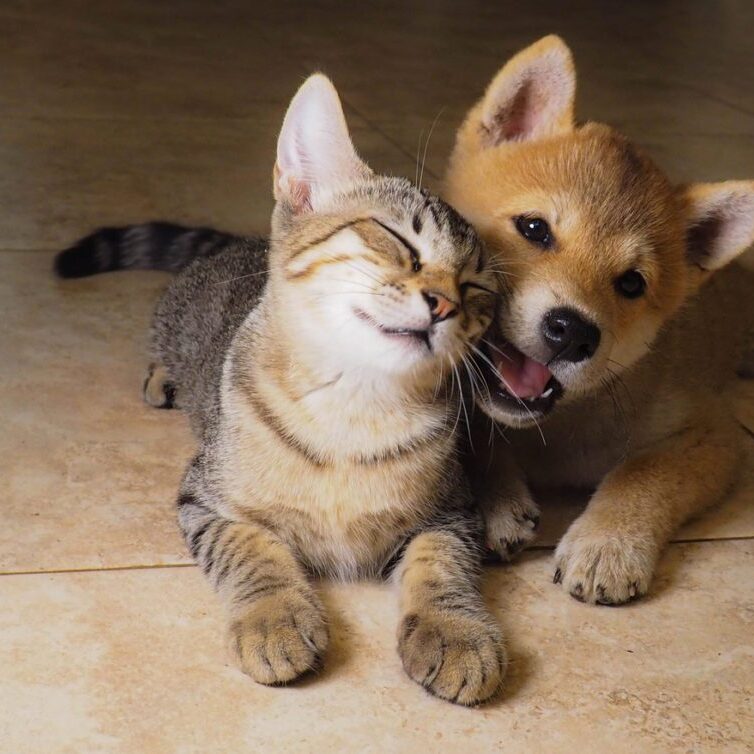Cat Health
Does My Pet Need a Multivitamin?

Who doesn’t remember chomping down on a chalky orange- or grape-flavored Fred or Wilma Flintstone vitamin or soft, sugary gummy vitamins? For mothers concerned about fast-food diets and picky eaters who turn up their noses at vegetables, handing out candylike multivitamins feels like insurance that their kids get vital nutrients for growth and health, no matter what they eat—or don’t eat.
As pet parents, we have the same worries. Our doggos and meowsers may eat a complete and balanced diet with all kinds of nutrition science behind it, but we have our own picky eaters and sick pets who back away with a look of disgust when presented with diets designed for their lifestage or health condition. (Remember doing that to your mom?)
Can giving them a multivitamin help? We asked veterinary nutritionist and VetScoop contributor Lindsey Bullen, DVM, DACVIM (Nutrition) for her take on multivitamins and pet nutrition.
As with so many things, there’s no single answer that’s right for every pet. A lot depends on factors such as age, health, eating habits, and whether the diet the dog or cat eats is a commercial food that’s complete and balanced, a therapeutic diet to help treat a disease, or a homemade diet.
More Isn’t Better
First things first: Healthy pets who eat a complete and balanced diet from a reputable manufacturer don’t need a multivitamin, Dr. Bullen says. They’re getting everything they need from their food. Adding a multivitamin (or any vitamin) seems like one of those things that can’t hurt, might help, but that’s not necessarily the case.
“The addition of the multivitamin could potentially unbalance the diet,” she says.
Is that a big deal? Often, the answer is yes.
It’s especially a concern with growing puppers. Too much of certain minerals or vitamins can affect skeletal development, causing rapid bone growth that results in orthopedic problems. Large- and giant-breed dogs in particular need to grow slowly to develop healthy bones, joints, and muscles. And an excess or deficiency in one vitamin or mineral—calcium, for instance—can have a cascade effect, contributing to excesses or deficiencies of other nutrients in the body related to healthy skeletal development. Everything gets thrown out of whack.
When a Multivitamin Might Help
There are times when a multivitamin can be a healthy addition to a pet’s diet. One is when they’re eating a homemade food. That diet is filled with all your love but unless it has been formulated by a veterinary nutritionist—which can easily be done—it’s probably not complete and balanced for daily consumption. Each pet has different nutritional needs based on their species (cat or dog), size, age, and health.
Dogs and cats may also benefit from a multivitamin when they aren’t eating enough food or aren’t eating the right food. That can happen when they’re not feeling well or have a health problem that’s being treated with a therapeutic diet—one prescribed by their veterinarian to treat a particular health condition such as kidney disease, urinary tract problems, skin disease or allergies, gastrointestinal upset, and more. Those therapeutic diets might be the cure for what ails pets, but they don’t always appeal to their taste buds. Some pets prefer what they have always eaten to anything new.
Lack of appetite can also be related to stress—a puppy in a new home, for instance—or to pain related to eating. Pets with poor dental health may find it painful to pick up food and chew it. Older pets might have a reduced sense of smell. All kinds of things can cause pets not to want to eat. And if it becomes a habit, or we start enticing them with goodies that aren’t part of their regular diet, they can develop nutritional deficiencies.
A day or three of poor eating isn’t going to throw your pet into a nutritional tailspin. Bullen knows this from personal experience. Her dog Heidi has a diet-responsive disease, and it’s not unusual for her to go through picky phases once in a while. While she might coax Heidi with a special meal of rice and ham, she doesn’t worry that her dog’s failure to eat a complete and balanced meal for a day or two is going to cause nutrient deficiencies that will affect her overall metabolism and quality of life because Heidi is an otherwise normal, healthy girl.
“Nutrient deficiencies take a little time to manifest,” she says, “but if you get that geriatric dog or even a puppy with a picky appetite that is routinely skipping meals or starting to lose a little weight and a little muscle mass, it’s demonstrating that they’re not meeting their calorie needs.”
Dogs who aren’t meeting their calorie needs probably aren’t meeting their nutrient needs, either. The energy and nutrients provided by food go hand in hand. If pets don’t take in enough food, they aren’t getting enough essential nutrients. In other words, they’re malnourished.
Signs of malnutrition include weight loss, diarrhea, and gastrointestinal upset, among other changes seen only on blood work. It’s not unusual in pets who are chronically ill or chronically anorexic, meaning they just don’t want to eat. Your 14-year-old dog who has become a picky eater due to age and illness is an example of dogs who may benefit from multivitamin supplementation. So is the pet who is on a low-calorie over-the-counter food but isn’t eating enough of it.
“They are the ones that may benefit from additional vitamin and mineral supplementation to make up for some of those deficiencies,” Bullen says.
However, it is important to always ask your veterinarian if this is the case with your pet.
On the other hand, senior or geriatric (there’s a difference!) pets who are eating puppy or kitten foods may not need supplementation with a multivitamin. Those diets tend to be augmented with essential nutrients, Bullen says, so even if the pet isn’t eating much, the food is so highly concentrated that they might not experience a nutrient deficit.
“It really depends on the individual, their individual disease state, their individual metabolic needs, and the diet they’re on,” she says. “If we’re treating diseases with nutrition, we have to keep in mind that it’s not just the food itself. It’s the individual nutrient profile that is treating their pets and multivitamins can upset that.”
Which Multivitamin?
Not all multivitamins are created equal. There are a couple of reasons why that’s the case. One is that each patient has unique nutrient deficiencies, so the same multivitamin isn’t going to be the best choice for every pet. It can be challenging to choose the right one for a particular animal’s needs. Multivitamins can’t meet every nutritional requirement.
For instance, pets who need additional protein can’t get it from a multivitamin. And the fat-soluble vitamins—A, D, E, and K—are stored long-term in the liver, so they are unlikely to need supplementation in the short term.
Multivitamins must be chosen carefully to meet each animal’s dietary needs. And since most puppers and kitties eat wildly varying diets, whether commercial or homemade, that’s no easy task. Of the multivitamins specifically designed for dogs and cats, few are appropriate to use with homemade diets, Bullen says.
“Just like people, dogs and cats require their nutrients to be provided and not only have the appropriate concentrations but also the appropriate proportions. For the majority of multivitamins out there, that’s just not the case. They’re either missing certain nutrients, or the nutrient concentrations are super-low.”
That’s also why you can’t share your own vitamins with your pets. We’re significantly larger than the majority of our pets, Bullen points out. One of our multivitamins provides far more supplementation than they need or is good for them. And vitamins made for humans may contain ingredients that are hazardous to pets, such as xylitol. Some children’s chewable vitamins contain the naturally occurring sugar alcohol often used as a sweetener in foods such as peanut butter and sugar-free gum, toothpaste, and supplements such as vitamins and melatonin. While it’s safe for humans, it’s highly toxic to pets, dogs in particular.
The other reason multivitamins aren’t all the same is that the supplement industry is not well regulated. No agency governs what goes into them or checks the quality and amount of the ingredients before manufacture. Manufacturers and distributors of dietary supplements and dietary ingredients are responsible for evaluating their products’ safety and labeling to make sure they meet U. S. Food and Drug Administration regulations as well as requirements set down under the Dietary Supplement Health and Education Act of 1994. The FDA only takes action against adulterated or misbranded dietary supplements after they reach the market.
“Rarely are pet supplements concentrated enough to make a difference,” Bullen says. “And if they are, then that worries me because they’re likely unbalancing my diet.”
The Bottom Line
Giving your floof a multivitamin can feel good. We all want to give our pets a nutritional boost if we can. But it’s always a good idea to talk to your veterinarian about it first.
With her own clients, Bullen is happy to evaluate the supplements they give their pets and either give them the okay to continue with it or explain why it could negatively affect what she’s trying to accomplish with diet or medication.
“Multivitamins absolutely can be helpful and appropriate in the right situation,” Bullen says.
Did you find this helpful? Share it!
Questions for your Vet
- What should I look for in a food for my large- or giant-breed puppy?
- Is it okay to give my cat tuna?
- How can I find a veterinary nutritionist to evaluate the food I make for my pet?
About VetScoop
Pets make our lives better. At VetScoop, we’re on a mission to return the favor by giving you access to trustworthy, science-based information so you can provide the best possible care for your pets.
Related Articles We Think You'd Like





